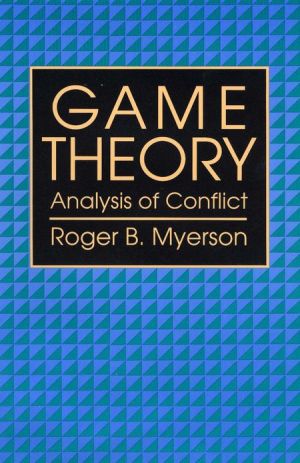

 |

|

Sold Out
Book Categories |
Preface
1. Decision-Theoretic Foundations
1.1 Game Theory, Rationality, and Intelligence
1.2 Basic Concepts of Decision Theory
1.3 Axioms
1.4 The Expected-Utility Maximization Theorem
1.5 Equivalent Representations
1.6 Bayesian Conditional-Probability Systems
1.7 Limitations of the Bayesian Model
1.8 Domination
1.9 Proofs of the Domination Theorems
Exercises
2. Basic Models
2.1 Games in Extensive Form
2.2 Strategic Form and the Normal Representation
2.3 Equivalence of Strategic-Form Games
2.4 Reduced Normal Representations
2.5 Elimination of Dominated Strategies
2.6 Multiagent Representations
2.7 Common Knowledge
2.8 Bayesian Games
2.9 Modeling Games with Incomplete Information
Exercises
3. Equilibria of Strategic-Form Games
3.1 Domination and Ratonalizability
3.2 Nash Equilibrium
3.3 Computing Nash Equilibria
3.4 Significance of Nash Equilibria
3.5 The Focal-Point Effect
3.6 The Decision-Analytic Approach to Games
3.7 Evolution. Resistance. and Risk Dominance
3.8 Two-Person Zero-Sum Games
3.9 Bayesian Equilibria
3.10 Purification of Randomized Strategies in Equilibria
3.11 Auctions
3.12 Proof of Existence of Equilibrium
3.13 Infinite Strategy Sets
Exercises
4. Sequential Equilibria of Extensive-Form Games
4.1 Mixed Strategies and Behavioral Strategies
4.2 Equilibria in Behavioral Strategies
4.3 Sequential Rationality at Information States with Positive Probability
4.4 Consistent Beliefs and Sequential Rationality at All Information States
4.5 Computing Sequential Equilibria
4.6 Subgame-Perfect Equilibria
4.7 Games with Perfect Information
4.8 Adding Chance Events with Small Probability
4.9 Forward Induction
4.10 Voting and Binary Agendas
4.11 Technical Proofs
Exercises
5. Refinements of Equilibrium in Strategic Form
5.1 Introduction
5.2 Perfect Equilibria
5.3 Existence of Perfect and Sequential Equilibria
5.4 Proper Equilibria
5.5 Persistent Equilibria
5.6 Stable Sets 01 Equilibria
5.7 Generic Properties
5.8 Conclusions
Exercises
6. Games with Communication
6.1 Contracts and Correlated Strategies
6.2 Correlated Equilibria
6.3 Bayesian Games with Communication
6.4 Bayesian Collective-Choice Problems and Bayesian Bargaining Problems
6.5 Trading Problems with Linear Utility
6.6 General Participation Constraints for Bayesian Games with Contracts
6.7 Sender-Receiver Games
6.8 Acceptable and Predominant Correlated Equilibria
6.9 Communication in Extensive-Form and Multistage Games
Exercises
Bibliographic Note
7. Repeated Games
7.1 The Repeated Prisoners Dilemma
7.2 A General Model of Repeated Garnet
7.3 Stationary Equilibria of Repeated Games with Complete State Information and Discounting
7.4 Repeated Games with Standard Information: Examples
7.5 General Feasibility Theorems for Standard Repeated Games
7.6 Finitely Repeated Games and the Role of Initial Doubt
7.7 Imperfect Observability of Moves
7.8 Repeated Wines in Large Decentralized Groups
7.9 Repeated Games with Incomplete Information
7.10 Continuous Time
7.11 Evolutionary Simulation of Repeated Games
Exercises
8. Bargaining and Cooperation in Two-Person Games
8.1 Noncooperative Foundations of Cooperative Game Theory
8.2 Two-Person Bargaining Problems and the Nash Bargaining Solution
8.3 Interpersonal Comparisons of Weighted Utility
8.4 Transferable Utility
8.5 Rational Threats
8.6 Other Bargaining Solutions
8.7 An Alternating-Offer Bargaining Game
8.8 An Alternating-Offer Game with Incomplete Information
8.9 A Discrete Alternating-Offer Game
8.10 Renegotiation
Exercises
9. Coalitions in Cooperative Games
9.1 Introduction to Coalitional Analysis
9.2 Characteristic Functions with Transferable Utility
9.3 The Core
9.4 The Shapkey Value
9.5 Values with Cooperation Structures
9.6 Other Solution Concepts
9.7 Colational Games with Nontransferable Utility
9.8 Cores without Transferable Utility
9.9 Values without Transferable Utility
Exercises
Bibliographic Note
10. Cooperation under Uncertainty
10.1 Introduction
10.2 Concepts of Efficiency
10.3 An Example
10.4 Ex Post Inefficiency and Subsequent Oilers
10.5 Computing Incentive-Efficient Mechanisms
10.6 Inscrutability and Durability
10.7 Mechanism Selection by an Informed Principal
10.8 Neutral Bargaining Solutions
10.9 Dynamic Matching Processes with Incomplete Information
Exercises
Bibliography
Index
Login|Complaints|Blog|Games|Digital Media|Souls|Obituary|Contact Us|FAQ
CAN'T FIND WHAT YOU'RE LOOKING FOR? CLICK HERE!!! X
 You must be logged in to add to WishlistX
 This item is in your Wish ListX
 This item is in your CollectionGame Theory: Analysis of Conflict
X
 This Item is in Your InventoryGame Theory: Analysis of Conflict
X
 You must be logged in to review the productsX
 X
 X

Add Game Theory: Analysis of Conflict, Eminently suited to classroom use as well as individual study, Roger Myerson's introductory text provides a clear and thorough examination of the models, solution concepts, results, and methodological principles of noncooperative and cooperative game theo, Game Theory: Analysis of Conflict to the inventory that you are selling on WonderClubX
 X

Add Game Theory: Analysis of Conflict, Eminently suited to classroom use as well as individual study, Roger Myerson's introductory text provides a clear and thorough examination of the models, solution concepts, results, and methodological principles of noncooperative and cooperative game theo, Game Theory: Analysis of Conflict to your collection on WonderClub |